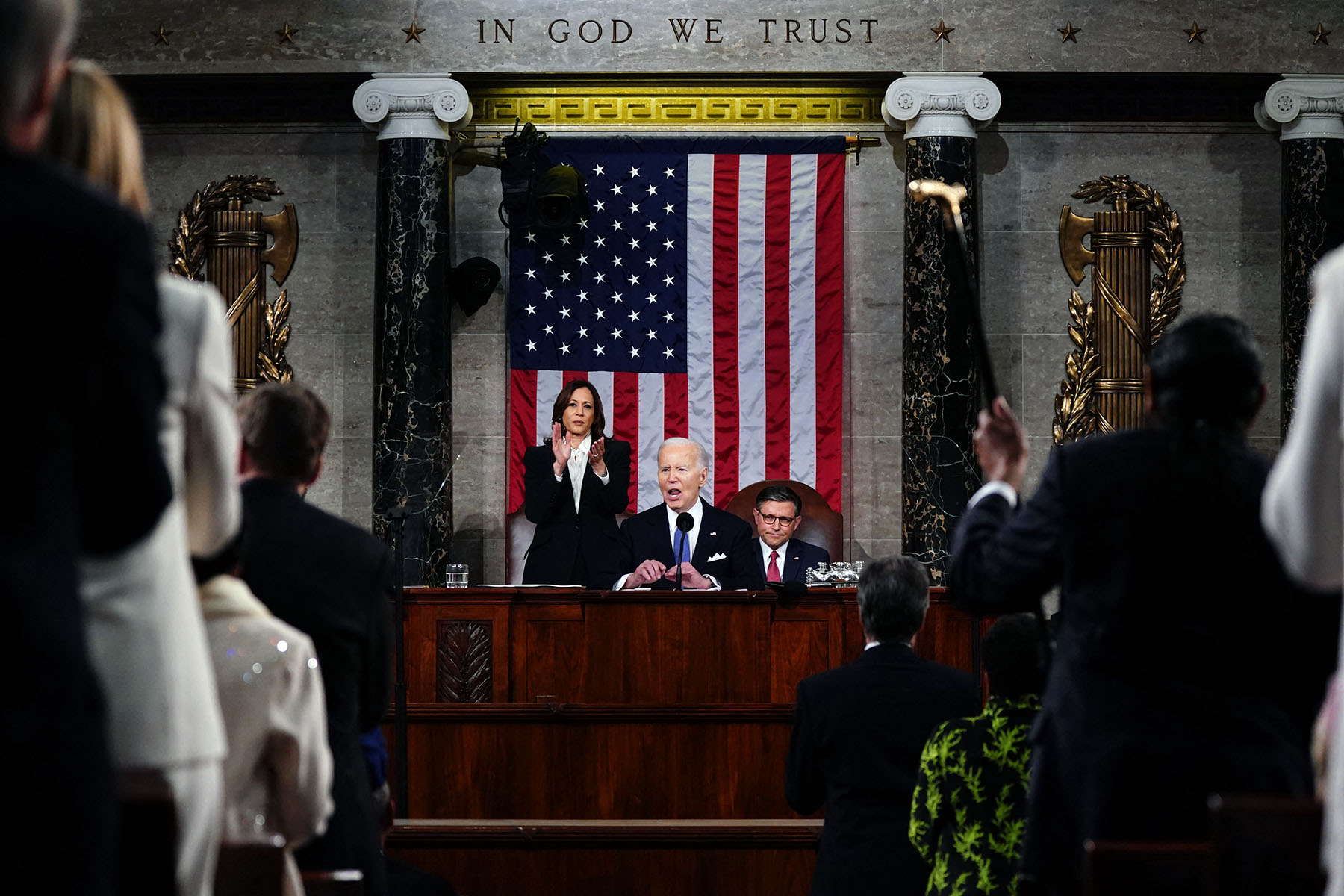This column first appeared in The Amendment, a biweekly newsletter by Errin Haines, The 19th’s editor-at-large. Subscribe today to get early access to future analysis.
Last week made me think a lot about the media, politics and performances.
On Thursday, I watched President Joe Biden deliver a fiery State of the Union address. It was in part a pitch to American voters and in part an attempt to prove his vitality amid concerns about his octogenarian status.
On Friday, I moderated a panel at SXSW with four barrier breakers to celebrate International Women’s Day. All were powerhouse panelists in their own right, but the clear headliner was Meghan, Duchess of Sussex, whose mere presence drew a standing-room-only crowd of more than 2.000.
And on Sunday, I watched the 96th Academy Awards. The night was the culmination of a six-month campaign by the Oscar nominees to win over voters. The process is not unlike the presidential campaign our country is currently in — where visibility, personality and likability, in addition to capability, are part of what translates into electability.
For me, all three events were a reminder of the value our democracy and society places on optics and not actions. But at what cost — and what do we miss when we focus on the seeing, rather than the doing?
President Biden is 81 and getting older every day. It’s an unavoidable fact and the basis for a narrative, in polling and the political press, that raises questions about whether he can or should serve a second term if he is reelected in November.
Biden sought to silence his haters last week on the floor of the House of Representatives as he delivered his address. For 90 minutes, he held forth with the demeanor of a happy warrior, calling out his opponent (whom he referred to as “my predecessor” rather than by name), sparring with Republican lawmakers and being cheered by his Democratic supporters.
Biden touted his record on the economy, his handling of the pandemic, infrastructure, his defense of Medicare and more. But the press’ main takeaways from the speech were more about style than substance.
-
Listen to The Amendment podcast:
-
Listen to The Amendment podcast: The Amendment: The Oscars are Political with Wesley Morris
The performance of the presidency as a litmus test for electability is nothing new, particularly since the dawning of the age of television. And it is perhaps a reasonable question for the oldest president and presidential candidate in American history, though competency is not only a function of seniority.
It was a question, prior to Thursday, that the campaign had struggled to answer — leaving the media to shape the story. A poll last month from Quinnipiac University showed that two-thirds of voters say Biden is too old to serve another term. But he addressed the concerns directly in his speech, telling voters: “I know I may not look like it, but I’ve been around a while… In my career, I’ve been told I was too young. And I’ve been told I am too old. My fellow Americans, the issue facing our nation isn’t how old we are; it’s how old are our ideas.”
In that same poll, 41 percent of voters said Trump was too old to serve another term; he would also be the oldest person elected as president if he wins in November.
Neither men’s age is something within their control, but what is are their approaches to how they plan to govern and lead the country if they are sent back to the White House. Covering the former at the expense of the latter misses the stakes of this election and is a disservice to voters.
I’ve been a journalist for more than two decades, and have interviewed thousands of people for thousands of stories. I have interviewed the first Black vice president more than any other political reporter since she took office.
I doubt most of the people in the room on Friday to hear from the Duchess of Sussex were very familiar with my résumé, and I am clear that I was not the reason most of the audience was in attendance or watching online.

Meghan’s mere presence was newsworthy, her every interaction, gesture and mannerism scrutinized before I could ask my first question and until the moment she left the stage. The interview itself was a type of performance, as proved by the media’s reaction to it.
We discussed many things over the course of an hour related to gender and representation, but you wouldn’t know it reading many of the stories recapping the panel.
Also on stage were veteran journalist Katie Couric, actor and advocate Brooke Shields and sociologist Nancy Wang Yuen, all accomplished women with interesting perspectives on how gender has shaped their careers and our society. I certainly appreciated the platform and an opportunity to highlight many of the issues we care about and cover at The 19th every day. I am equally proud of another interview I did the day before.
The Amendment’s first live podcast taping was also in Austin, with trans journalist Imara Jones. We talked about 2024 and the idea of Texas as a battleground state where the GOP is workshopping potential tactics for their national culture war strategy. Our robust conversation was a different kind of currency for me: a reminder of the existential stakes of this election for so much of our audience that helped me to even better frame how I am thinking about our politics in this consequential year.
Everything is political and gendered, including the Oscars. A line from Wang Yuen in our SXSW conversation on Friday echoed in my head as I watched the program: “In the Year of Barbie, are we living in the World of Ken?
There were many first-time nominees of color, but few who took home the top prize. Three of the 10 films nominated for best picture were directed by women — a historic first — but only one woman was nominated for best director. Cillian Murphy took home the best actor statue as expected, but Lily Gladstone, who made history as the first Native American woman to be nominated for best actress, did not win. And while Da’Vine Joy Randolph won best supporting actress, the award for her singular performance came for a racially fraught role typically honored by the academy — that of a Black woman in service to a White person.
I unpack all of this — and the politics of the Oscars — with New York Times Pulitzer Prize-winning film critic Wesley Morris in the latest episode of The Amendment. The actors’ on-screen performances were nearly lost amid the different kind of acting they’ve had to do since last fall, in front of the Oscar voters, in interviews, always looking the part with little room for error. The parallels to our presidential politics weren’t lost on Wesley or me.
When we focus on the performance of a role — whether it’s a president, advocate, or actor — as a means to a win, we ignore the work behind the job. Often, that’s the thing we don’t actually see — or worse, what we as a press can choose not to show. That doesn’t serve our audience when the time comes for them to make the most informed choice.
At events, it’s a way to bring attention to the work of advocates, using star power to amplify the message. In entertainment industry awards, it’s a distraction from what we saw on our screens.
And in our politics, it’s an approach that rewards showing over doing, which isn’t how we should pick our leaders.







